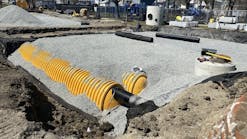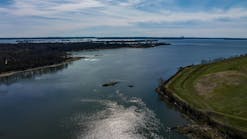As with anywhere else in the US, water is a precious source of life, recreation, and commerce in Denver, CO. Still, there are people who either purposely or accidentally engage in actions that compromise its quality. That’s where Nick Trujillo, stormwater quality investigator, comes in.
After complaints of illicit discharges come through on the city’s 311 line, dispatch sends them through the system to Trujillo, whose job it is to help protect the 155 square miles of the entire city of Denver as well as Denver International Airport property. Trujillo questions the person filing the complaint about the nature of the discharge, its possible source, and its duration. He then uses a GIS map of Denver, checking into aerial photos in the stormwater layer, which features every storm line and inlet. He finds the site, identifies its owner, and prints out a map. If it’s an emergency, he responds immediately; otherwise, he’s onsite within 48 hours. Trujillo writes up a report on his findings and logs it in case the state or EPA wants to conduct an audit. It’s also part of a record that goes into an annual report submitted to the state of Colorado. Illicit discharges into the city’s storm sewer system can originate from a residence or business, resulting in anything from a verbal or written warning to a citation and order into court. The responsible party may have to do cleanup or remediation and bears the cost. An exception is when the city cleans up the area and then bills the offending party for cleanup costs. Trujillo uses all of the tools at hand and enlists the help of different city departments. “We’ve had cases where it’s been monitored for several months trying to figure out where it’s coming from. We get calls that it’s starting again, and I’m pulling manholes. It really gets to be somewhat of an environmental CSI sort of deal,” he says. “It takes time, but generally we find the responsible party. There are occasions where we don’t, and that’s the frustrating part.” Trujillo also does post-construction investigations on sites over an acre that require a stormwater quality feature to filter stormwater coming off the site to ensure it is in place and operating as intended.
What He Does Day to Day
As a water-quality investigator for Denver Public Works, Trujillo handles between 70 and 100 reports of illicit discharges into the City and County of Denver’s storm sewer system each year. Additionally, he’s inspecting public and private post-construction water-quality systems “to ensure environmental standards in Denver are met to help secure the city’s water resources for the long term,” he notes.
What Led Him Into This Line of Work
Trujillo didn’t initially set out to become a stormwater quality investigator. He had studied finance at the Metropolitan State University of Denver but became a stormwater quality investigator as a result of a promotion. “In the beginning of my career, I connected with great mentors who were experts in the field and taught me everything I know today,” says Trujillo of his on-the-job training.
What He Likes Best About His Work
“Every day is different, bringing with it new challenges that test my knowledge to educate the public about environmental laws—even in some cases when I must enforce the rules, regulations, and penalties involved with those laws,” says Trujillo. “A big part of my job that I’m passionate about is when I’m able to help resolve a resident’s environmental concern. It’s that interaction with the community, as well as environmental experts and other professionals, that I value the most about my work.”
His Greatest Challenge
Trujillo notes that at times, it is challenging to help people understand the complexities of environmental laws and why they are in place. “However, with each case that comes to my desk, I approach it as another opportunity to help educate someone about why it’s important to protect Denver’s environment,” he says. “This way, in the future, that person will hopefully gain more appreciation for the environment and make positive choices.”






